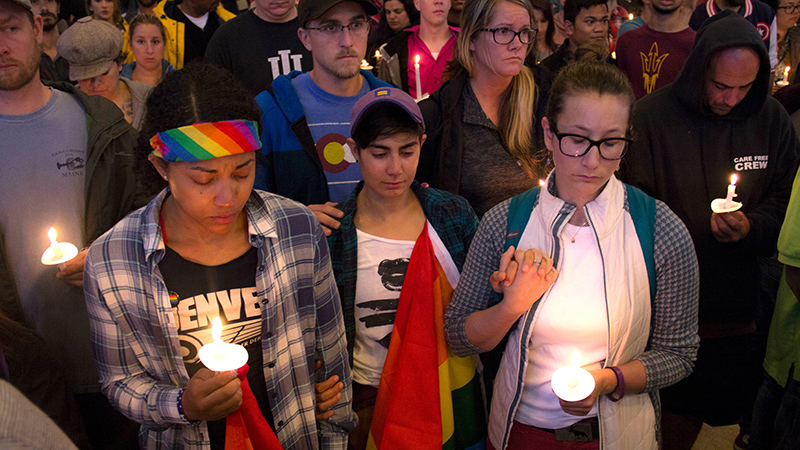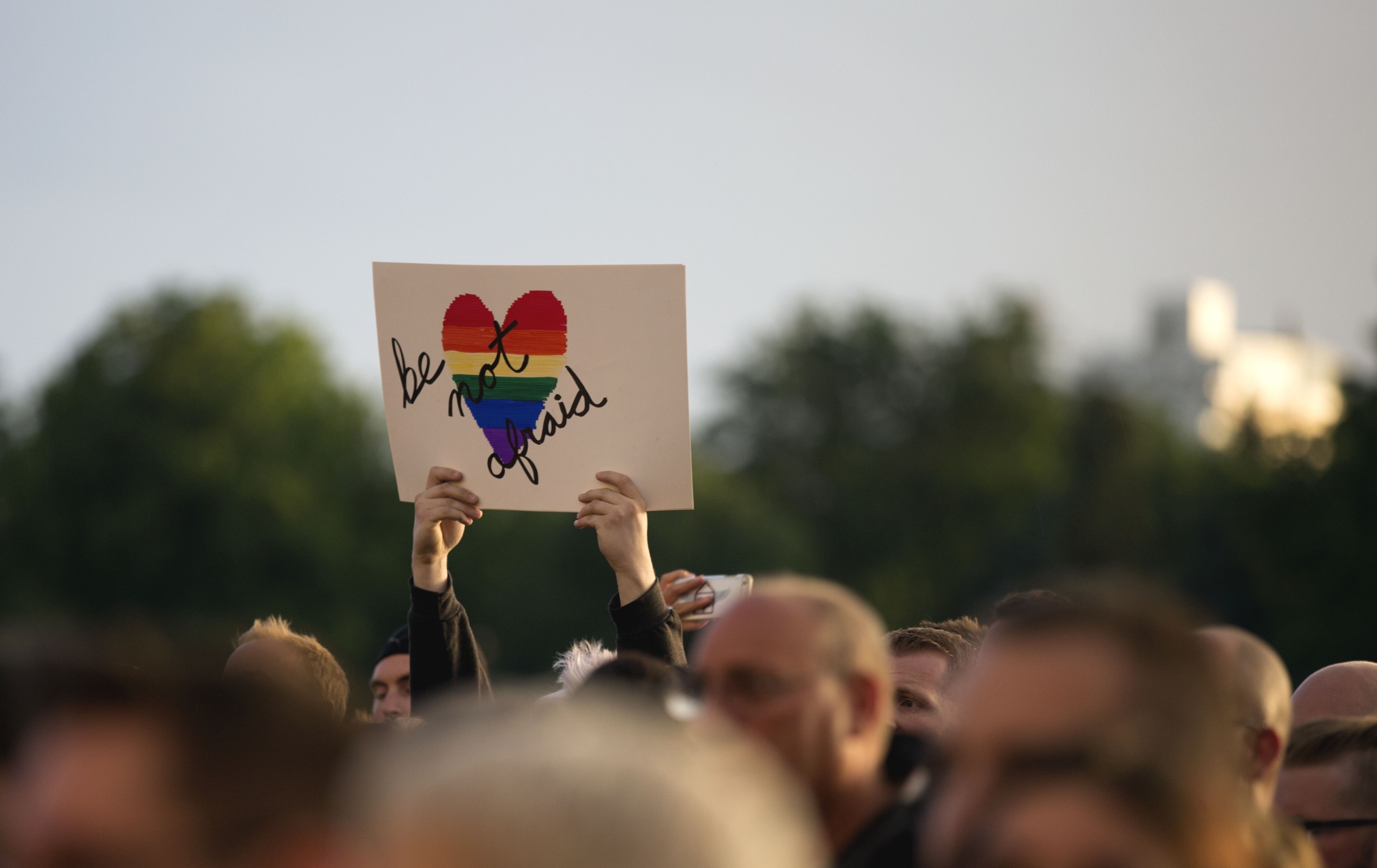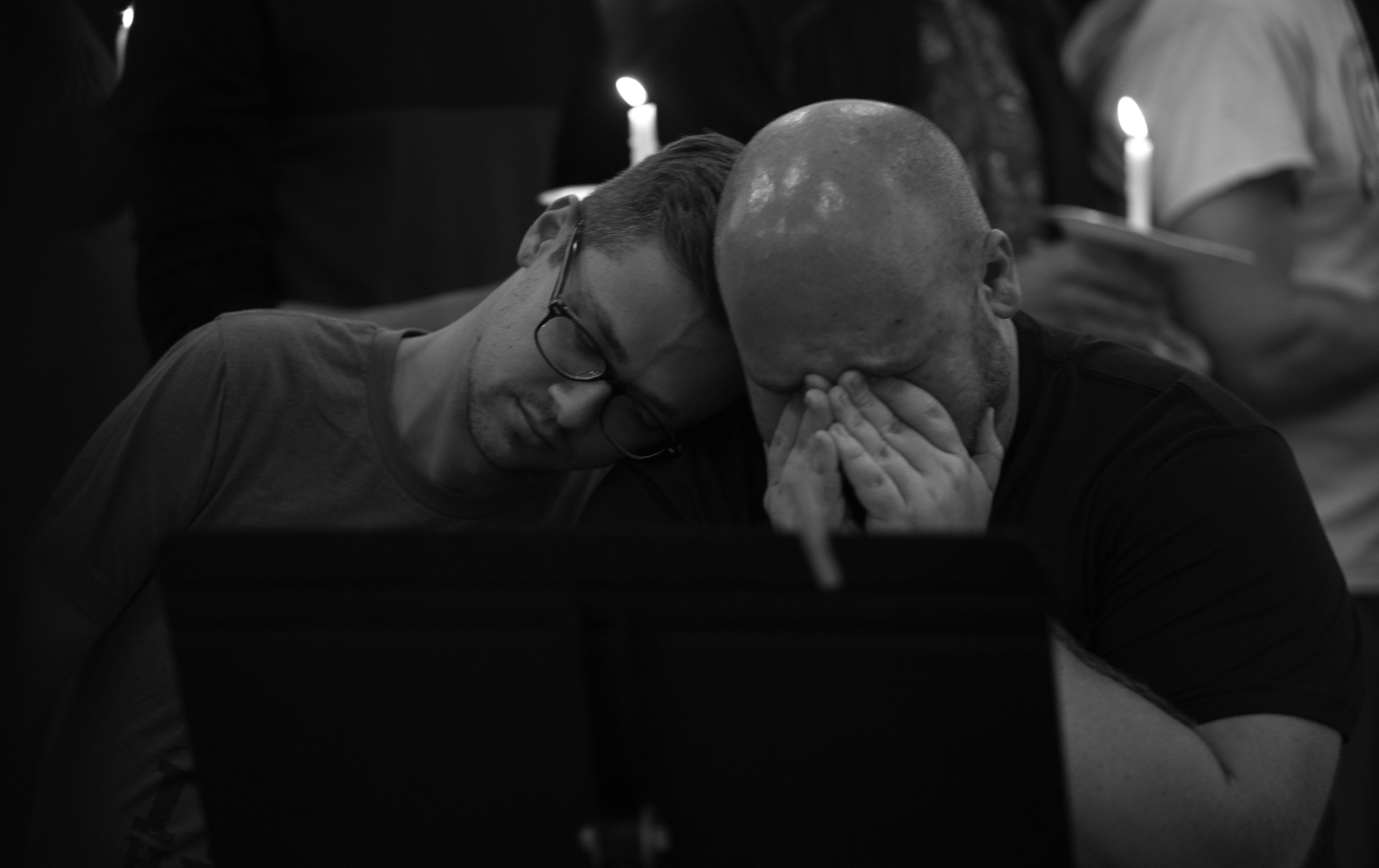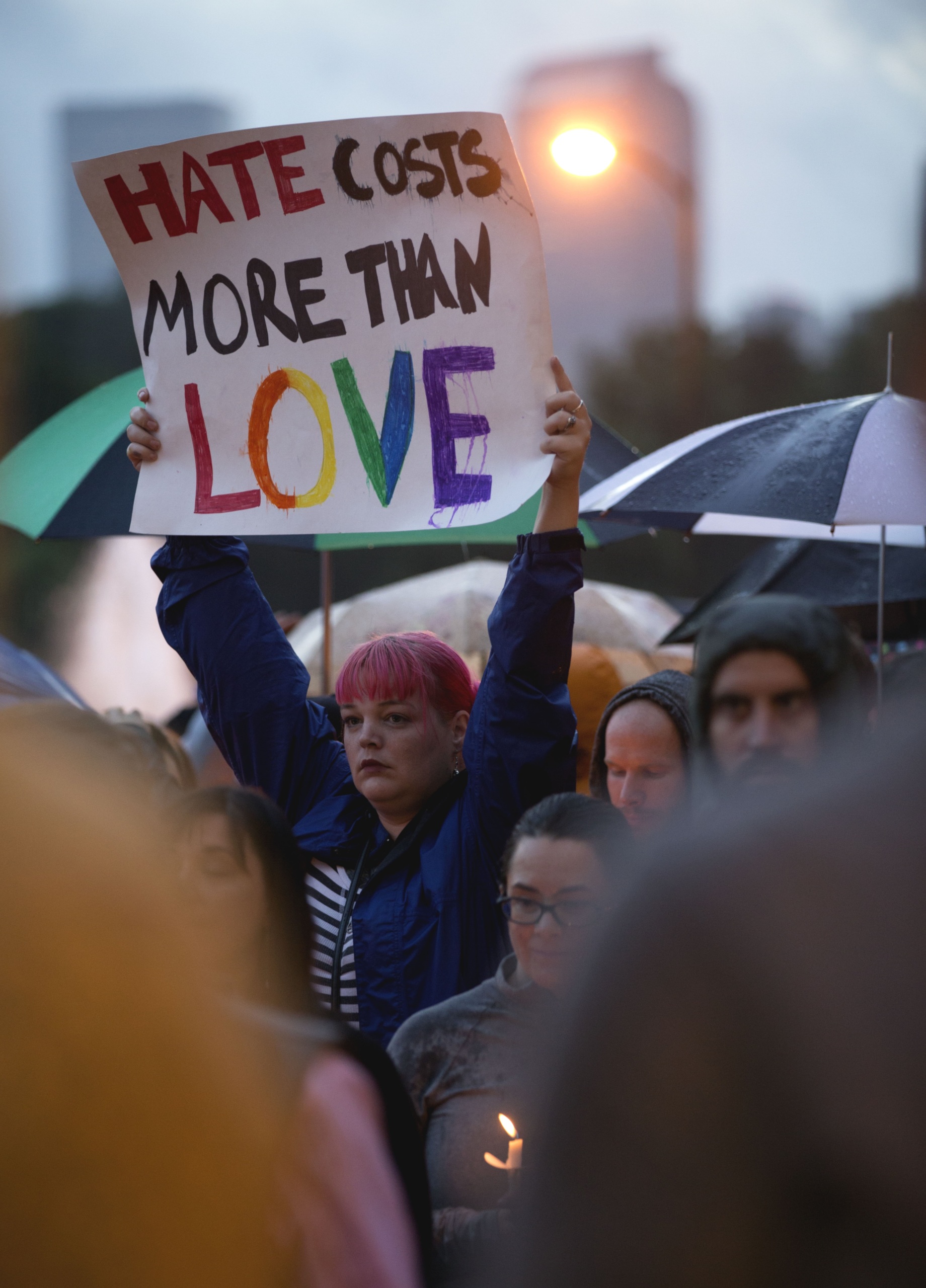
A vigil in Denver’s Cheesman Park for the victims of the June 12 shooting that killed 49 at a gay club in Orlando, Florida. Photo by Alexander Perez
A vigil in Denver’s Cheesman Park for the victims of the June 12 shooting that killed 49 at a gay club in Orlando, Florida. Photo by Alexander Perez
On Monday night in Denver’s Cheesman Park, thousands gathered for a vigil mourning the 49 people, most of them gay and Latino, who were killed during Sunday morning’s massacre at an Orlando nightclub. A full rainbow stretched across the dusk sky, and then ceded to more rain.
For many in Colorado’s LGBT community, the attack at Pulse nightclub felt personal.
“Our staff is walking around in a haze,” says Dave Montez, executive director of the LGBT advocacy group One Colorado. “I’ve felt personally and physically exhausted. Some of that is lack of sleep. Some of that is just the toll of knowing that it could have happened here, that any one of us could have been in a club like that on any given Saturday.”
The mass shooting came after years of progress in the LGBT fight for respect, equal rights and protection under the law. It also came as a reminder to some that violence is a constant threat.
Montez was one of a handful of speakers who addressed the crowd in Cheesman Park. He said he had been asked many times that day to address the issue of whether the shooting made people in the queer community feel unsafe.
“For too many of us, worries over safety are a daily occurrence,” he said.
Later, in a phone conversation, Montez elaborated. The threat of rejection—to the point of harassment and violence—is a source of simmering stress. Just recently, he recalled, a car pulled up next to him as he was walking down the street in Denver. The driver rolled down the window and yelled a homophobic slur.
Some in the community experience it more acutely than others.
“The transgender community faces concerns the minute they walk out of the home, particularly transgender women and [trans] women of color,” Montez says.
They may be immediately identifiable as trans and fearful of violence from strangers. Or they may be subjected to harassment for something as basic as showing identification that doesn’t match their gender identities, said Daniel Ramos, One Colorado’s deputy director.
“Gay and lesbian people of color face higher rates of violence and discrimination, because we live at that intersection of not only dealing with racism but also dealing with homophobia,” adds Montez. Both he and Ramos are Latino.
Eighteen percent of LGBT people of color in Colorado have experienced anti-LGBT physical abuse, according to a survey conducted by One Colorado, compared with 16 percent of LGBT whites.
The experience of rejection has fostered resilience in the LGBT community, says Montez. But the stress takes a steep toll. A One Colorado report from 2014 found that 36 percent of transgender Coloradans had contemplated suicide in the past year, compared with 4 percent of the overall population. Ten percent had actually attempted suicide within that year, compared with 1 percent of the overall population.
Gay and lesbian youth in Colorado, according to a state survey, are four times as likely as heterosexual students to have considered suicide, twice as likely to be bullied and four times as likely to say they have missed school because they feel unsafe.
Dr. Sarah Burgamy is a Denver-based clinical psychologist who specializes in helping clients with challenges related to sexual orientation and gender identity.
Burgamy says that in the last few days, she has talked to clients who describe profound sadness, as well as fear and anxiety, from the Orlando shooting. But she says she was also surprised to see another thread emerge in many of her conversations: A sense of empowerment. A feeling of pride. An insistence on showing up at Denver PrideFest this weekend.
“It’s kind of a paradox,” she says. As images come in from vigils held around the world, and as people in the queer community have sought each other out for support, the reaction she’s seen has been: “‘Not only am I not going back in the closet. I’m going to be more out.’”
The policy changes of recent years have brought practical changes to the lives of people who want to visit their loved ones in the hospital, or add their partner to their health insurance. But just as importantly, says Burgamy, they’ve bolstered the sense of support that LGBT people feel from their communities. And family and social support is a strong predictor of health.
“People feel validated by policy,” for better or worse, Burgamy says. “Our collective psychology says if that’s the policy, it means most people agree. I’m allowed to exist without explanation. I’m worthy.”
The Orlando shooting was jarring because it bucked this trend, says Burgamy.
At Monday’s vigil, Montez offered practical advice for those who want to be helpful: Reach out to an LGBT friend to see how they’re doing. Give blood. And in a line that won emphatic applause, “Be kind to our Muslim neighbors and co-workers.”
In the One Colorado office, some people lost friends in Orlando, says Ramos. They’ve been supporting each other by seeking solace from their friends and partners, husbands and wives. They’ve been trying to eat right, exercise, get enough sleep.
“The team has pulled together,” he says. “It has been a great way for us to be cohesive in a really difficult time.”
Berkeley professor john a. powell, a leader in thinking about equity and health, has described the social determinants of health as primarily about belonging. A child’s access to education, an adult’s ability to obtain the job they want or to live in a safe neighborhood—all these can be boiled down to belonging, or not.
People in the LGBT community, especially people of color, have fought hard for this sense of belonging. One of the most brutal ironies of the attack in Orlando was that it happened at a place that is supposed to offer refuge: a gay club. On Latin night.
“For this to have taken place in a safe space, this space that belongs to LGBT people, is the ultimate violation of the belief that the world has a just nature to it,” says Burgamy. Going forward, she expects to see some people struggling with once again feeling safe in places that used to feel inviolable.
Nic Garcia, a Denver-based journalist who has written about LGBT issues, posted this on his personal Facebook page. I’m reposting with his permission:
The rampage in Orlando is uniquely American.
Not because of our gun problem—yes, that is part of it.
But because this country was built upon oppression of others. White, black, native, immigrant, gay, straight, trans, able, disabled, Christian, Muslim. Too many of us find some way to keep the “others” out of our orderly life.
“You can’t sit with us,” is not only mean, but too often a way of life in the U.S.—including the LGBT community.
Maybe, just maybe, if we allowed the intersection of all of our identities to flourish, like at Latin night at a gay bar, we’d have less hate and bloodshed in our country.

Photo by Ruben Ramirez-Castillo

Photo by Ruben Ramirez-Castillo

Photo by Ruben Ramirez-Castillo